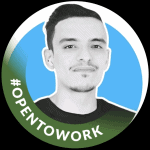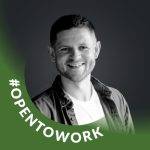I'm building the best in-depth library of real FAQs from Solopreneurs
"I’m going to set myself up as a freelance designer, but not sure how I get clients?
If I absolutley HAD to get clients in the door,
If I were to start freelancing from scratch, here’s what I’d do first to get clients in the door:
- First, I’d read my guide on starting freelancing from scratch 🤣
- Then I’d create an offer around skills I already have,
- brand my profile and messaging around a powerful offer, here’s my guide to building an offer
- have a stab at creating a valuable lead magnet that leads into the next problem you solve.
- Start publish content with a social media strategy funnelling traffic into the lead magnet (such as a free audit)
- Reach out in DMs and get the leads into sales calls
- Then refine and optimize your system as you learn.

- — from Claire
- Freelance product designer
- Read full Q&A
"Is it a red flag someone has moved jobs alot? (when hiring)
I have been both a unicorn, AND the world’s worst employee…
I moved jobs a lot and was even fired!
It’s insane how bad you have to be to get fired.
I would argue most people don’t even get fired when they are unable to do the job they are paid for.
Just look at the public sector 😂😂😂
So it’s more likely they have left bad jobs willingly.
Who’s the last one to leave when a business culture is a complete 💩 show?
The coasters, the unambitious, the lazy ones.
Good people make the hard choices:
So the best people are the first to jump ship when conditions aren’t right.
The ambitious, the driven, the intelligent ones.
When my bosses allow me more freedom, to action my ideas I was the hardest workers, I would work late without thinking about it, or asking for more. I would take initiative on things, and made them a lot of money.
But If im in a dead end job,
If the job is below my skill level,
if I have no control or agency over my projects…
I get bored very quickly,
lose my energy, and the job seems pointless,
so I don’t even try.
So they could be a deadbeat,
but it’s more likely they are ambitious and intelligent,
in jobs which don’t challenge or inspire them.
Ask them why!
But there’s only one real way to find out.
Run a small test and see if they jump on it lol
I have a guide on how to find and hire the dream team, and how to run low risk tests with them, can send a link if you want?

- — from Dean
- Read full Q&A
"How can I integrate purpose into daily routines?
Purpose comes from doing.
Anytime I feel I’m lacking clarity, or purpose,
- I figure out my long term vision of what I want my life to look like.
- Reverse engineer that ➡️ goals
- Break goals ➡️ steps
- Steps ➡️ repeatable actions
- Plug those actions into my daily schedule
- Then stick to the schedule.
It removes the overwhelm of choice for me And keeps me working towards my purpose, even when I can’t see the results or progress.

- — from arijit
- Web Designer
- Read full Q&A
"I doubt I’m good enough yet to start a freelance career, I worry I need to learn more skills first.
I doubt myself and skills, I worry I’m not good enough yet to start a freelance career. I work with WordPress to make websites, I was thinking to add Webflow as a skill too, I always think I have to learn more skills before I start?
I wouldn’t worry about being good enough. The truth is if your starting out you’ll make a lot of mistakes and fail a lot and that’s fine.
There’s very little risk to starting, it might not work out, but it costs nothing to start so you haven’t lost anything by trying.
You don’t need to be the best, you only need to be slightly better than your competition.
In fact you don’t even need to be a better designer;
you only need to be better at communicating with the client.
RE freelancer skills…
don’t add multiple skills that do the same thing (webflow, wordpress, Squarespace).
Instead stack skills that multiply your value,
and lead naturally into each other
- (web design + SEO)
- (Landing pages + ads)
- (Photography + motion design)
You don’t need skills before you start,
You start then learn the skills you need as you go.
Courses for “doing” skills like web design won’t get you far, the best way to learn is by coming across real problems for real clients in your projects, then solving them.
If you’re not sure what skills to focus on, after you have X2 valuable services under your belt, focus on learning sales it will help you grow fastest and build a safety net of profit in the early days, when clients are harder to find

- — from Said
- Web designer
- Read full Q&A
"I’m thinking about doing freelancing. I don’t know whether to do branding, strategy, or coaching. What is it that you do?
Sort of…. My “day job” is design services, which I offer through Design Hero but I do consulting for entrepreneurs around digital marketing.
“branding, strategy, consultant” can all go together. There’s enough overlap.
You can also offer consulting as a side solo gig while working fulltime or as a solopreneur
Example:
I run my design agency, Design Hero.
Over the years I’ve stacked a lot of high value skills so my offer is a full package for launching a succesful startup:
- brand design
- web development
- digital marketing to drive traffic (usually SEO)
But I can also offer consulting on any of those aspects for entrepreneurs who want to do it themselves, but with extra guidance.
In fact I usually tack on a 4th part to my offer:
I also sell monthly “super sessions” which is basically consulting, or coaching on a retainer basis
I can advise on business strategy, automations, growth, growing a team, marketing, and any other problems that I’ve solved myself.
If you’ve solved problems in your own life or business you can sell the solution to others.
You can also build a personal brand as a solopreneur around the particular niche you decide to focus on

- — from Nathan, Graphic designer
- Graphic Designer
- Read full Q&A
"I am a frustrated freelancer I need help
Oh wow that’s a lot of problems lol!
❓ Finding paying clients with the skillset I have
https://lifebydesign.online/leads/
❓ finding time and money to expand my skillset
I recommend these articles
https://lifebydesign.online/time/your-day-is-your-life/
https://lifebydesign.online/growth/freelance-growth-hack/
https://lifebydesign.online/productivity/big-tasks-require-small-actions/
❓ how to find them and talk to them in a way that shows them how I can solve their problems
This would be solved by having an offer that speaks to pain points in your ideal audience.
recommend downloading my offer worksheet and working through it:
https://life-by-design-online.ck.page/230c220556
❓ Consolidating my presence online and creating free content that shows my skillset
https://lifebydesign.online/systems/solopreneur-content-strategy/

- — from Marta
- Freelance Motion Designer
- Read full Q&A
"How do I get my first job as a designer?
It can be really tough getting your foot in the door as a junior.
My advice is just keep trying.
Speak to friends and family and so some favour jobs to build experience of working with real clients.
Get on Upwork and start doing you own thing to.
On Upwork you’ll need to be prepared to work for very little in order to build up reviews and cred first.
My advice on this is quantity over quality.
Do lots of tiny small jobs, be honest in your proposal and say your new and looking for experience and reviews, and in exchange offer a much lower price than the competition.
Trade time for reviews.
Of course to get reviews you have to offer a great service.
This doesn’t mean being the best designer or developer,
It means being the best communicator, making sure your client has a good experience.
Of course you’ll want to provide a good result too. But experience is as, or more, important.
One thing I like to do is go above and beyond.
If you quote for redesign of a homepage, do some design changes on the about page and let them know you’ve thrown it in as a bonus extra 🙂
Then as your profile and success rate grows, you can start charging your worth and increase over time.

- — from Anon
- Read full Q&A
"How do I get a junior design job as a web developer, or should I start freelancing?
There’s certainly lots of potential for you in this career, web developers will always be in demand.
But you’ll need to be able to demonstrate skill and ability to stand out.
This is tough if you haven’t had a job in this area first.
If you can’t find paying clients take on personal projects.
They only way to stretch your skills is to take on real world challenges and constraints.
build as many different things as you can!
These personal projects become your portfolio, which will be a stepping stone into your first paid gigs.
There are several routes for you,
You can find a job to get some experience,
Or you can start freelancing.
Both have their own challenges.
A job means secure monthly payment, and not much responsibility.
There’s an attraction in this.
But a job isn’t as safe as it used to be.
Most small companies can’t afford to pay juniors the money they need to meet rising costs of living.
Larger companies don’t really want juniors.
In addition.
I don’t believe that job are the long term “safe option” they used to be.
I myself was fired from a job the day before I was going to ask for a raise.
Freelancing, or starting your own side hustle, is tough.
Freelancing means working for many years for not much money.
But with freelancing, your earning cap is potentially unlimited.
You will also have a LOT more freedom to live the life you want.
But it’s a lot of pressure.
You have to learn to do literally every job role yourself.
You have to bring in your own work.
In the end, you have to decide what’s right for you.
Of course, you can find a job AND freelance as a sidehustle, which is what most folk do these days.
It’s a safe way to go.

- — from Anon
- Read full Q&A
"How do I start freelancing from scratch?
I’ve expanded and moved a more full response to this question here

- — from Jonathon
- Architect
- Read full Q&A
"Should I quit my job now, or wait and grow my sidehustle first?
I wouldn’t quit without a secure income lined up, but I wouldn’t wait to start sidehustling either.
Many people are already freelancing and side hustling.
The two aren’t mutually exclusive.
If you’re are torn between wanting to quit and being able to quit,
you don’t want to be in a position where you’ve got to start growing a side-hustle from scratch.
You can make a huge difference in six months to a year, but obviously, as with anything, the change is a trajectory.
You want to start growing your sidehustle as soon as possible.
Give yourself options:
If you’re torn between wanting to quit and being able to quit,
you don’t want to be in a position in four years where you’ve got to start growing it from scratch.
If you find yourself in this situation,
then it’s going to take you years,
you will have to work a job you don’t enjoy,
and you’ll feel pretty bad about it
If you find yourself in this situation, then it’s going to take you years, you will have to work a job you don’t enjoy, and you’ll feel pretty bad about it.
I worked long hard for years plus evenings and weekends,
and even then for almost a decade my side-hustle made almost zero money.
Real success is just consistency + time.
During that time were a lot of difficult choices,
a lot of second guessing,
a lot of agonising.
Set aside time to work on your sidehustle everyday and keep consistent.
It can be boring and hard and slow but that’s what’s required if you want to build a new life.
So I would say the earlier you can start growing your side hustle, the better.
If you can grow your side hustle to where you are earning as much as your full-time job and you don’t need the work.
It puts you in really the ideal position to quit, while still having a secure income
So don’t quit unless you’re ready,
but don’t wait to grow your sidehustle!
If you’re ready to start, here’s a roadmap to start freelancing from scratch

- — from Patrick Groneman
- Freelance Illustrator
- Read full Q&A
"How did you go from freelance, to agency owner, to mentor? because that’s what I want 😄
Hey Ivan, great question!
So it didn’t happen overnight, it was an organic progression for me over many years.
I’ll break down my journey for you:
This is going to be pretty much off the top of my head, unedited and unembellished.
From Fired to Freelancing
Since I was a teen, I have always designed things as a hobby.
This turned into a sidehustle, so I’ve always done my freelancing I guess.
It earned me some extra pennies while I was studying at university.
Later as I went into the world of work I kept doing it as it added to my income. It never made much money, sometimes as little as £500 a year.
For most of my life it was not enough to sustain me as a career.
This is something most gurus online don’t talk about. People aren’t honest about it on social media:
Every time I see a post where someone claims to have quit their job, started freelancing a years ago and now they earn £10k/m,
I want to shout:
“Did you, aye? BOLLOCKS!”
It’s a harmful myth that makes people feel crap about where they are.
We all have different starting points, different responsibilities and advantages/disadvantages.
But the truth is if you want you grow your own business, if you want true freedom, if you want to escape the ratrace…then it takes many years of working hard for little reward.
Most people aren’t willing to work hard for no return for a few months, never mind a few years.
Every “overnight success” you see is just action + consistency + time.
It took almost 10 years for my side-hustle to earn enough money to sustain me.
Every year, my clients, and my earnings, grew tiny bit by bit. Eventually, it reached a point where I started to glimpse it as a full-time income.
I remember during lockdown I was officially furloughed, but unofficially I was expected to work on the sly.
Around this time I think everyone had their “great awakening” and we all had a glimpse of what life could be, outside the status quo of the commute, the 9-5 etc.
A lot of people had no work to do whatsoever. For months! This blew my mind!
I watched people go nuts. People were drinking more, bored out their minds, addicted to Netflix.
But they also had time with family. Time to get outside during the day and walk in nature.
At the time I resented the fact that I had to work, but in hindsight I think it actually saved me.
I’m not made to be idle. I don’t think anyone is.
So with a little more spare time, I started reading books by the masters of lifestyle design:
Tim Ferris’s 4 hour workweek, the 80/20 rule, the compound effect, Hell Yeah or Hell No, Free Time and more. you can check out my reading list
I read every day, I read like a mofo, and then I read some more.
This opened my eyes to what is possible.
Most people aren’t even aware of what is possible with the right knowledge.
Read every day for 6 months and you won’t even recognise yourself.
Apply what you learn every day for 6 months and you won’t even recognise your life.
Reading opened my eyes.
I became dissatisfied with the idea of working a 9-5 the rest of my life, of being underpaid, undervalued, constrained in my hours and actions.
It no longer seemed tolerable.
At that point I thought; “if I can just get x2 clients a month at 1k each I could quit”.
It lit a new fire in me, and I remember calling up enquiries on the way to and home from work, and designing logos for £120 on my laptop on park benches during lunch breaks, my hands were so cold I could hardly work the mouse.
I was working pretty hard. I think this is a necessary stage in growing your side-hustle into a career.
But it’s not sustainable. Eventually caught up with me in a big way…
My boss found out I was side hustling and he didn’t like it.
I never hid Design Hero, but I never shouted about it either, for obvious reasons:
Most bosses don’t like their employees to have their own motivations and aspirations outside of the job.
Most bosses expect employees to be 100% loyal and dedicated to putting more money in the company’s pockets, instead of helping themselves first.
But loyalty should work both ways; I was underpaid for the number of roles I was filling;
I was a web designer, coder, project manager, social marketer, SEO and more.
I’d been promised multiple raises, commissions etc for a while, which never materialised, I was getting pretty fed up of waiting already was watching my Design Hero income.
I started wondering if I could make the leap to full-time freelancing.
Then fate made the decision for me:
Some of my work won some awards, I posted it on LinkedIn. My boss found out about Design Hero.
At the time I was working remote from home, and I made the fatal mistake of calling an enquiry for Design Hero during work time.
It was my failure and I shouldn’t have done it. I failed to maintain a proper separation between work and my sidehustle; something I was normally very strict about.
I justified it because I often worked late and overtime for my 9-5. I never asked or expected to be paid overtime for this, working hard is just part of who I am. So I didn’t see any harm in swapping the time and making it up later.
But it was a conflict of interest, he found out and fired me on the spot.
I don’t blame him, he was a nice boss, he was hurt as he felt betrayed and that I was living a double-life. He wasn’t wrong!
I was working full-time and working my side-hustle on evenings, weekends and even lunch breaks. My heart was with Design Hero rather than my full time job.
So he did me a favour and forced me to make the leap.
Looking back now, as a boss myself, I think it’s naive to think that people who work for you won’t also work for themselves.
This is even more true now as living costs outpace the rate of pay.
There’s a certain type of person who is always learning. Who picks up multiple valuable skillsets. Who takes initiative without instruction. Who questions “Why”? Who stays curious, works hard and outgrows their job title again and again.
If you are someone like this, then most bosses at small businesses can’t afford to pay you what you are due and you’re probably destined for freelancing or solopreneurship.
I try to keep this in mind. If my team have aspirations, instead of trying to stop them, or making them think they have to hide it, I teach them, help them, and advise them.
From Freelance to agency owner
I see being fired as a turning point where my income took a quantum leap over a short period of time.
Looking back, I think this route gave me an advantage over other designers:
Because my time was so limited I was forced to work differently:
I didn’t have hours to call clients, to chase enquiries, to churn through the admin, to chase invoices.
I had to work smart not hard.
I thought now that Design Hero was my only job I’d have loads of free time.
But it turns out your tasks expand to fill the time you have. It even has a name: “Parkinson’s Law”.
I reached my first £10k/m and I was miserable. I was totally burned out, and maxed on time.
I was working for myself, I’d reached 6 figures, I’d achieved everything I had everything that I’d strived for.
So why was I miserable?
It was a critical realisation for me:
After you have enough, more money won’t make you happy.
This cliche is so commonplace it’s practically gospel.
But it’s one of those one’ you have to experience first-hand to understand.
Many never earn enough to learn this lesson.
It’s a good problem to have. Certainly better than burning all your time to make enough money.
‘Enough’ is different for everyone. But it’s probably less than you think:
I have a theory most folk would be much happier earning £70k/yr on a 3day workweek than £120k+ working 5 days.
After that point, time quickly becomes far more valuable to you.
You’ll find yourself spending what would have previously been obscene amounts of money, just to buy back your free time.
So I built systems, automations, scheduling, templates etc. to 10x the limited time I had.
Every time I did a task I would spend twice as long trying to figure out a way to avoid having to do it again.
This was the foundation that allowed my business to scale without me putting in more time.
1 year after being fired I had periods where I made more in 1 month than my whole annual salary.
Nevertheless, there’s a limit to how much you can grow by yourself…
By that point, I’d spent ten years building websites, and I had to continue to support existing clients, whilst finding new ones to grow my income.
It became so that I was spending more time on support than growth.
So my first hire was someone to help me with small support tasks for WordPress sites.
This I guess is the first step towards an agency:
Moving from doing everything yourself to having help with fulfilment, so you can free yourself up to work on big picture tasks, growth, sales, systemizing your business etc.
By the next year I’d managed to optimize my business down to a 3 day workweek.
I still prefer not to think of myself as an agency owner.
I still think of it as a solo business, but I guess since I do have a small team,
I’d describe Design Hero as a micro agency for startups.
Yet I have to face the fact that I do have a small team under me,
and I spend more time running the business, building systems etc than I do doing design these days.
It’s a new set of skills to learn, new challenges, new problems.
Life is always learning.
In a solo business, you ARE the business.
So personal growth = business growth.
They say being a manager is watching someone take x10 longer to do the job half as well as you would lol.
But as always you have to think super long-term. If you take the time to train, and to teach, with patience, it pays off in the form of more freedom.
I teach every freelancer as if they were a student of mine, and were paying for my time.
I take the time to review, critique and explain everything I do for them.
I record my work, explain my thinking, outline the strategy, the Why, and the Why nots.
I teach the soft skills like client management, policy settings, boundaries etc, all the difficult stuff that they don’t teach you in design tutorials on Youtube.
From Agency Owner to Mentor
At this point I had enough money to live comfortably. I had systemized a lot of my business so I also had free time.
At first I used this time for leisure.
I hiked, I played video games, I worked in the garden, I took bike trips, and I even did a bit of lifestyle design;
I looked at my childhood dreams and got into motorsport in a small way. It was a great summer.
But I’m not made to sit still.
I started to feel a creeping anxiousness that I couldn’t explain.
I used the Five Whys to work through it to figure out what I was feeling and basically, I found that I was bored.
It’s like video games: When things get too easy, you get bored.
People need a challenge. So I sought my next challenge and took time to think about my life and what I wanted to do.
I sought something which would give me a sense of purpose, of how I could do something with meaning.
Just as I never set out to be an agency owner, I never set out to be a mentor either.
Teaching my team naturally led into teaching other freelancers.
I was already recording training, doing daily teaching and c oaching to nurture my team’s skills.
My freelancers kept telling me that instead of my paying them, they should really be paying me, just for the stuff I was teaching and mentoring.
I wasn’t fishing for complements, several of them said this unprompted. So I thought there was something in that…
I figured a good way to do that would be to help other freelancers navigate the problems I’d already had.
I was already getting questions on social from freelancers on how to solve some of them.
I repurposed my social accounts for my coaching platform, I write every day about running a multi-six-figure business on a 3 day workweek,
and I share the systems and strategies I use every day in Design Hero.
I write about all the problems I’ve had, how I solved them, and how to do it without getting burned out.
(spoiler alert, I still get burned out sometimes!)
But people get value from the content, they contact me to ask me questions, just like this, and I give them answers freely, and then I ask them if they want further help.
That’s how I got into coaching.
It doesn’t make much money.
But I have enough money, it gives me purpose to help freelancers.
I try not to let it become a business;
I write for the sake of writing and nurture the habit.
I treat it the same way as I did Design Hero when it was still a sidehustle:
Instead of focussing on profit, I treat it as getting paid to learn about coaching, and learn my audience’s problems.
I’ve been helping freelancers solve their problems for about a year now.
They bring me their problems, and I give them solutions that have worked for me, and I check-in to make sure they are working through the problem to a solution.
I’ve noticed they often bring me the same problems, and that they often aren’t aware of what the real problem is.
So sometimes I give them a roadmap and framework to go through to…
- Redesign their lives
- Optimize the business for profit & freedom
- Systemize their business as a lifestyle business
So the next step for me is taking my 1-1 coaching and turning the format into a more structured cohort-based course which I’m calling Systemized Solopreneurs;
The goal is to help frantic freelancers redesign their lifestyle, build a 6 figure business around it that puts life first, and systemize it to give them freedom without burnout.
That’s pretty much where I’m at now!
I’m sure there’s more to it that I’ve forgotten, but that’s the broad strokes!
If you’d like help along this journey, reach out for a chat, I’d love to talk to you more about it.

- — from Ivan
- Motion Design Director
- Read full Q&A
"When in my solopreneur journey should I start automating?
the best time to start automating is yesterday. The second best time is now. 😂
Lol seriously though, start as soon as you can so you can buy back your time.
The only caveat:
Automation multiplies your inputs
If you automate a bad process,
you multiply the bad outputs.
Make sure you’ve done the messy manual work first,
So you can optimize the process before you automate it.
When to automate a solo business
Rule of thumb: If you’re going to do it more than once a week, try to automate it,
or at the very least build a template.
Example: even the smallest things like LinkedIn connection messages can be templated, and saved as a snippet in your notes.
It may take you an hour to build an automation for a 5 minute task.
Most people aren’t willing to do this.
But those 5 min tasks are going to continue to pile up, and a good automation quickly returns your time back to you.

- — from Tunca
- Founder
- Read full Q&A
"What is the reason for my failure and how do I fix it?
Hmm impossible to answer without a specific context…. But I’m not sure failure is something to be fixed;
Western society and particularly school teaches us that failure is bad.
But failure is an essential part of the learning process.
The reasons behind the failure are unimportant.
It’s learning from your failure that is important.
Each failure is a lesson.
Don’t get upset about it, just learn from it, try again and try not to make the same mistakes again.
That’s what personal growth is in a nutshell!
Successful entrepreneurs are just the ones who fail a lot and keep trying.

- — from Tanvir
- Freelance designer
- Read full Q&A
"What is one thing you wish you knew before starting a lifestyle business?
Growing a business by yourself is difficult.
One thing I wish someone had told me before starting my own business is that the learning never ends!
I can’t understate the importance of learning in entrepreneurship, especially for a lifestyle business.
YOU ARE THE BUSINESS.
Your business is built around you:
Your knowledge, your growth, your skills.
If you want to grow an exceptional businesses, you won’t get there by doing it like everyone else.
If you do things like everyone else, the only way to get ahead is to work harder.
The more knowledge you have,
the better equipped you are to make decisions that can impact your startup’s growth and success.
Successful entrepreneurs prioritize learning, and use that knowledge to stay ahead of the curve, by working smarter,
and by applying new skills to deliver more value for their customers.

- — from Featured
- Read full Q&A
"What’s one thing I should do to grow as a freelancer?
The one thing that propelled me from 5 to 6 figures?
Reading. 🚀
Here’s some topics to explore that can really shape you from a frantic freelancer to a sytemized solopreneur:
Human Behaviour
🧠 Reading books on human behavior gave me priceless insights into understanding people…
Understand your team, your clients, your audience, yourself.
When you understand how people tick and why they do what they do…
- You’ll be able to sell things
- You’ll be less aggravated by the silly things people do.
- You’ll understand your own motivations and weaknesses.
- You’ll get along with people better
- You’ll be happier and more connected.
Business
💼 Sales and business books became my mentors.
You don’t build a solo business by doing things the way everyone else does them.
The foundations don’t change much, but you have to think differently and figure out new ways to do things.
Luckily someone else has probably done it first.
Learn from the greats.
Philosophy
💡 And then there’s philosophy.
The OG life coach in my opinion.
Helps you deal with all the curveballs that get thrown your way,
AND helps you stay happy once you’ve made it.
In my opinion, Stoicism is something they should teach in school to help with…
- resilience
- happiness
- realism
- coping
- ambition
Application
Now, let’s talk about reading every day for 15 minutes.
If you can make time, in 6 months you won’t recognize yourself.
Your mind is your biggest weapon, train it and feed it. 💪
Don’t know where to start?
These books helped me shortcut my journey from 5 to 6 figures in a couple of years.
Here’s my 6 figure reading list for solopreneurs

- — from Anon
- Read full Q&A
"Should I gain more skills, or should I focus on mastering one skill?
A bit of both….
When I started DH whenever a client asked me if I offered a service, I would say yes then quickly go learn how to do it and offer it to other clients:
Mastering a skill takes time, but I find if you focus properly, you can usually learn the broad strokes of most skills pretty quickly.
You only need to learn enough that your better at it than the customer.
But now that I run my own business I don’t have time to do that anymore.
Nowadays I find someone better than me and pay them to do it.
My goal for you is to become the owner of your own business,
the only way to do that is to eventually get “off the tools” and onto higher-value work (sales, managing clients, setting up systems, lead generation)
I try to reduce my core services to offer 3 basic services which complement each other. Brand => website = SEO.
When it comes to tools…
I stick to ONE platform or ONE tool and get really familiar and quick with it.
Example, for web design, some people use Shopify, some Webflow etc.
Personally I use WordPress and Elementor and I’ve mastered those.
So if someone wants a E-commerce website or a booking website I know exactly how I’ll achieve that, what plugins to use, how they work etc.
HOWEVER skills are different.
Marketing nowadays is complex.
It’s absolutely essential that you pick up the basics of other fields that complement your niche.
You don’t need to master them but being good at copywriting is going to aid your website design.
Knowing a bit about SEO and keywords is going to help your websites rank.
Knowing a bit about email marketing will help you create a good E-commerce website and so on.
The best strategy is to try to be a T-Shaped marketer ;
Be a master at a few skills, and a novice at multiple skills that amplify the benefits of your core skill set.

- — from unkown
- Read full Q&A
"What are the most important design tools I should Learn
Honestly, your tools don’t matter.
They will all change in 5 years anyway.
There are a huge no. of tools available in every field,
and the ease of these tools and templates available makes it too easy to run before you learn to walk.
Instead, spend time on learning the foundations.
I see a huge number of freelancers never learning the fundamentals.
If you’re a designer, focus your time on learning about hierarchy, composition, balance, contrast etc.
I’d spend 80% of my time learning Typography, this is the quickest way to elevate your designs to the next level.
Time saving cheat:
copy others.
Take the time to actually recreate what they’ve done, and unpick it, reverse engineer it:
- why have they used that letter spacing?
- why those colour shades?
- why have they used less padding on the top of that button than on the sides?
- Read design case studies
- Google it, read about it, and repeat it.
When it comes to tools…
Don’t be distracted by the latest shiny object.
You don’t need to be proficient in Adobe premiere, capcut, Filmora to edit videos.
pick one software which gets the job done and do it.

- — from Unkown
- Read full Q&A
"How do I get work experience for design jobs?
You’ll need to be able to demonstrate skill and ability to stand out.
This is tough if you haven’t had a job in this area first.
If you can’t find paying clients, take on personal projects.
The only way to stretch your skills is to take on real-world challenges and constraints so find a fake design brief online, and create as many different things as you can!
These personal projects can become your portfolio, which will be a stepping stone into your first paid gigs.
There are several routes for you for paid work:
You can find a job to get some experience,
Or you can start freelancing.
Both have their own challenges.
A job means secure monthly payments and not much responsibility.
There’s an attraction in this.
But a job isn’t as safe as it used to be.
Most small companies can’t afford to pay juniors the money they need to meet rising costs of living.
Larger companies don’t really want juniors.
In addition.
I don’t believe that jobs are the long-term “safe option” they used to be.
I myself have been fired from a job only the day before I was going to ask for a raise.
The second option is freelancing, or starting your own side hustle, is tough.
Freelancing means working for many years for not much money.
But with freelancing, your earning cap is potentially unlimited.
You will also have a LOT more freedom to live the life you want.
But it’s a lot of pressure.
You have to learn to do literally every job role yourself.
You have to bring in your own work.
In the end, you have to decide what’s right for you.
Of course, you can find a job AND freelance as a side hustle, which is what most folk do these days.
It’s a safe way to go as there’s not much risk to freelancing when you have a job to pay the bills!

- — from Anon, high school student
- Read full Q&A
"How do I get my first job as a freelancer?
It can be really tough getting your foot if your starting out as a freelancer or junior designer.
My advice is just keep trying.
Avoid “bottom of the barrel” platforms like Fiverr, Bark or People per Hour.
Speak to friends and family and so some favour jobs to build experience of working with real clients.
If you have an existing network, check out my automated referral system which can generate a lot of those precious first leads for freelancers.
Get on Upwork and start offering your freelance services.
On Upwork you’ll need to be prepared to work for very little in order to build up reviews and cred first.
My advice on this is quantity over quality.
Do lots of tiny small jobs, be honest in your proposal and say your new and looking for experience and reviews, and in exchange offer a much lower price than the competition.
Trade time for reviews.
Of course to get reviews, you have to offer a great service.
This doesn’t mean being the best designer or developer,
It means being the best communicator, making sure your client has a good experience.
Of course you’ll want to provide a good result too. But experience is as, or more, important.
One thing I like to do is go above and beyond.
If you quote for redesign of a homepage, do some design changes on the about page and let them know you’ve thrown it in as a bonus extra 🙂
Then as your profile and success rate grows, you can start charging your worth and increase over time.

- — from Anon, high school student
- Read full Q&A
Want to ask a question about solopreneuring?
Somtimes I get asked stuff about how I run my life and business. If the answer has value to other people, I post it here.
If you have a question, submit it below and I’ll notify you if it’s published.
If I don’t know the answer I’ll ask someone who does.
I hope this is valuable to my audience.
Things people ask about 👉
- Lifestyle business model
- Running a solo business
- Freelancing
- Design
- Branding
- Sales
- Lead generation
- Conversion
- Automation
- Systems
- Business policy
- Mindset
- Skills
Your contact details will be private. The answer to your Question will be public so other solopreneurs learn from it.